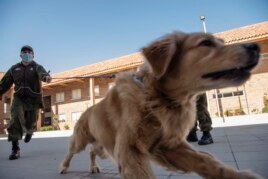04 August 2020
The new coronavirus continues to infect people around the world, so many of us are looking for information about the virus and the disease it causes, COVID-19.
The Google Trends website has been following the top virus-related questions in Google's search engine. In June and July, one of the most-asked questions was – can animals get COVID-19?
This coronavirus, also called SARS-CoV-2, is new to humans. Where it came from has yet to be confirmed, and research is continuing. Researchers already know a lot about other viruses in the coronavirus family. Most of them, they say, began in animals.
Experts at the U.S. Centers for Disease Control and Prevention (CDC) explain that these viruses include MERS-CoV, the coronavirus that causes Middle East Respiratory Syndrome, or MERS. It also includes SARS-CoV, the coronavirus that causes severe acute respiratory syndrome, or SARS.
CDC experts also give this explanation: "Sometimes coronaviruses that infect animals can evolve and make people sick and become a new human coronavirus." Three recent examples of this are MERS-CoV, SARS-CoV and SARS-CoV-2.
The CDC is the top public health agency in the United States.

Members of the Chilean Police Canine Training team play with a Golden Retriever dog named Clifford, before the beginning of its training session aimed to detect people infected with coronavirus COVID-19
Can animals get COVID-19?
The CDC confirms that, worldwide, a small number of cats, dogs and other pets have been infected with SARS-CoV-2. Most of these infections came after the animals were in close contact with human carriers of the virus.
The World Health Organization (WHO) also reports that some dogs and cats in contact with infected humans have tested positive for COVID-19.
Like humans, infected pets might get sick or they might not have any signs of the disease. The CDC says most pets sick with COVID had a minor form of the disease and fully recovered.
On July 30, the Associated Press reported that the first dog in the United States sickened by COVID-19 has died.
Named Buddy, the 7-year-old German shepherd lived in New York. He became sick in April while his owner was recovering from the coronavirus. Buddy had the same symptoms as human patients. These symptoms included difficulty breathing.
Buddy was put to sleep, or euthanized. The decision to end his life came after he developed very serious health problems.
It is not known if the coronavirus played a part in those very serious health problems. Animal doctors told the family that blood tests showed Buddy likely had lymphoma, a blood cancer.
Can I get COVID-19 from my pet?
The CDC's website reports that "at this time, there is no evidence that animals" play a large part in "spreading the virus that causes COVID-19." The WHO says pet-to-people transmission of the coronavirus is unlikely.
COVID-19 is spread through human-to-human transmission, mainly "through droplets produced when an infected person coughs, sneezes, or speaks."
Keeping you and your pets safe
Until more is known about how the coronavirus affects animals, experts say to treat pets as you would family members. The CDC suggests the following:
- Keep cats inside your home when possible.
- Walk dogs on a leash at least 2 meters away from others.
- Avoid taking your pet to crowded public places.
- Do not put face coverings on pets.
- Limit your pet's contact with non-family members.
- There is no evidence that the virus can spread to people from the skin and the fur of pets. So, do not clean your pet with chemical cleaners not approved for animal use.
Protect pets if you are sick
If you are sick with COVID-19, you should stay away from your pets and other animals, just as you would with people.
When possible, have another person in your home care for your pet while you are sick. However, if you are sick and must care for your pet or be around animals, wear a cloth face covering and wash your hands before and after you interact with them.
If you are sick with COVID-19 and your pet becomes sick, do not take your pet to the doctor. Call the doctor and let them know you have been sick.
And that's the Health & Lifestyle report for this week.
I'm Anna Matteo.
Anna Matteo wrote this story for VOA Learning English with information from the Associated Press and the CDC. George Grow was the editor.
________________________________________________________________
Words in This Story
evolve – v. to change or develop slowly often into a better, more complex, or more advanced state
positive – adj. good or useful
symptom – n. a change in the body or mind which indicates that a disease is present
leash – n. a long, thin piece of rope, chain, etc., that is used for holding a dog or other animal
fur – n. the hairy coat of an animal
transmission – n. the act or process by which something is spread or passed from one person or thing to another
droplet – n. a tiny drop (as of a liquid)
cough – v. (also n.) to force air through your throat with a short, loud noise often because you are sick
sneeze – v. (also n.) to suddenly force air out through your nose and mouth with a usually loud noise because your body is reacting to dust, a sickness, etc.
euthanize – v. to killing or permit the death of hopelessly sick or injured individuals (such as persons or domestic animals) in a relatively painless way for reasons of mercy